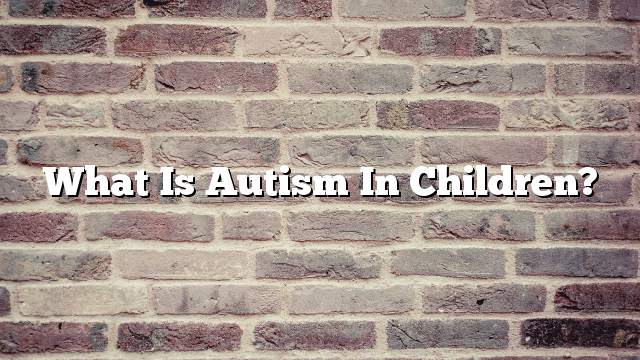What is autism in children?
Autism is a neurological and behavioral disorder in children that results in a defect in the basic functions of the brain, which causes a disability in the mental development of the child, and the disease begins from infancy and continues for life, and the child suffers from autism in the process of communication and communication with others, in addition to difficulty in speech and problems In behavior, the patient’s cognitive and behavioral development can be developed if early intervention is involved.
Causes of Autism
The causes of autism are not known for sure, but have been more likely than the cause, including:
- Genetics: A group of genes have been discovered to have a cause of autism and other genes that determine the degree of disease risk.
- Environmental factors: Environmental factors are considered to be a catalyst for the emergence of the disease, such as the possibility of a viral infection or air pollution.
- Problems during labor.
- Weakness of the child’s immune system.
- The amygdala in the brain is a catalyst for autism.
- Vaccines given to children against measles, mumps and others may be a factor in autism in the child because vaccines contain preservatives and a quantity of mercury and thimerosal. This is still a point of contention among researchers. Most vaccines currently Do not contain thimerosal.
Factors that increase the risk of autism
There are some factors that increase the likelihood of infection, including:
- Sex of the child: The probability of male injury is greater than that of females. It affects five males to one female.
- Family history: Having an infected child is likely to recur.
- Infectious X chromosome syndrome, a syndrome that leads to brain dysfunction.
- Tourette syndrome, which is called epilepsy.
- Late procreation, especially for men over the age of forty.
Symptoms of autism
The child who suffers from autism suffers from developmental difficulties in terms of social relations, pronunciation, language and behavior. The symptoms vary from one child to another. Every child with autism behaves differently from others. The risk of the disease varies from child to child, Some children are very sick, they have no ability to communicate, and there are many aspects that characterize this type of disorder.
Symptoms of social autism
- Lack of visual communication, he often looks at others.
- Do not listen to the person talking.
- Do not respond when prompted.
- Not feeling others.
- Inertia, an autistic patient likes to play alone, and builds a world of his own.
- Do not accept the idea of touch, he refuses embrace or peace.
Symptoms related to language skills
- The child is late to speak, and may reach a large age when he does not speak.
- The inability to utter the words fully, and may utter them once and forget them again.
- When he wants anything that is visually connected only.
- He speaks in a voice like a man’s voice, a strange voice like a song.
- Do not initiate talk.
- Repeats phrases, does not know what or how to use them.
Symptoms of autism behavior
- He repeats the movements, where he shakes a lot, waving his hands.
- Invents his habits, and always repeats them.
- He does not accept change, loses his temper and may get mad.
- moving a lot.
- Surprised by the things around him, like the wheels of the car.
- Sensitive to any excessive annoyance, such as intense light, high sound.
Treatment of Autism
Most of the treatments available to autistic patients are offered to all patients depending on the severity of their illness, but the treatment tools are child aids.
- Treatment in behavior, developing skills and developing communication and communication skills.
- Educational treatment.
- Treatment with medications and sedatives.
- Alternative treatment, which includes treatment by a specific diet and creative and innovative methods.
